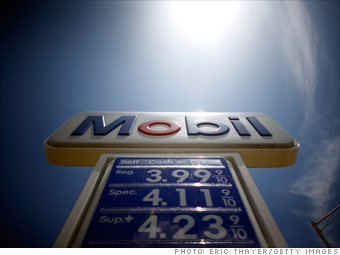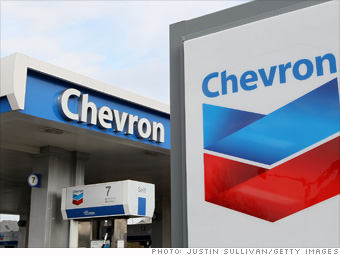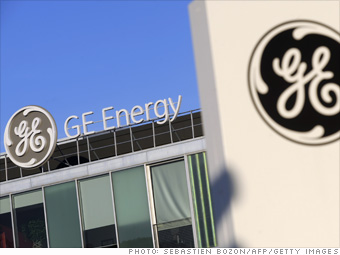
Before taxes, the world's largest retailer banked $22.1 billion in profit. After deductions and factoring in its international operations, the company still paid just under a third of that back in taxes to various governments.
The federal tax rate for corporations is 35%. Wal-Mart's effective income tax rate came in just under that, at 32.4%
It works the same way for individuals. Just as a person can lower his or her tax rate through deductions and credits, so too can major corporations, said Scott Hodge, president of the Tax Foundation.
But remember, income taxes aren't the only payments major companies make to the IRS. "Wal-Mart probably collects and pays more sales taxes than any other company on earth," Hodge said.
Exxon Mobil: $15.1 billion

Exxon paid the most taxes last year of any U.S. company, by far -- but not a cent went to the IRS for income taxes. That's because the oil giant does business in some of the mostly highly taxed countries in the world. Want to extract petroleum in Nigeria? Be prepared to fork over up to 85% of your profit in tax payments.
Exxon doled out more than $15 billion in income tax payments to foreign countries last year. U.S. tax codes allow companies to take massive deductions in light of those international charges, which knocked Exxon's federal income-tax bill down into negative territory.
That said, Uncle Sam gets his money in other ways. Including sales taxes and duties, Exxon recorded $7.7 billion in U.S. tax costs last year, and paid even more overseas.
Its grand total in global taxes for the year? A whopping $78.6 billion. The company's effective income tax rate was a hefty 47%, its highest in three years.Chevron: $8 billion

Some businesses save money on taxes by logging their biggest profits in low-tax countries. But like Exxon, Chevron has little choice about where it can extract oil. Thanks to the billions it sends overseas, Chevron faced an effective income tax rate of 43% last year.
It's perfectly reasonable, under the tax code, for a company with multinational operations to reduce its U.S. tax bill to $0, said Eric Toder, an institute fellow at the Tax Policy Center.
"In order to avoid having profits taxed in two locations, the host country gets the first bite of the profits," he said.
Think U.S. companies should be paying the U.S. government first? Take it up with lawmakers, not the oil companies.
"There are not as many loopholes in the corporate tax code as people think, and there are legitimate reasons for which these companies pay as much or as little as they do," said Scott Hodge, president of the Tax Foundation. "If anybody complains, they should not blame the companies, they should blame Congress -- they wrote the tax code.General Electric: -$1.1 billion

GE doesn't break out taxes at the federal, state and international levels.
General Electric didn't have to pay the IRS a dime of income tax in 2009. That's because the company's financial services division lost a boatload of money, giving GE a tax break it used to offset income from its other business lines.
"This is the first time in at least decades that GE has reported negative U.S. pretax income, and it reflects the worst economy since the Great Depression," said Anne Eisele, GE's director of financial communications.
GE also books most of its profit overseas, where it can defer taxes indefinitely. The unusual combination of a U.S. loss and postponed international taxes left GE with a $1.1 billion benefit to its bottom line from taxes -- and an effective tax rate of negative 10.5%, a nice break from the 5.3% tax rate it recorded in 2008.Bank of America: -$1.9 billion

Like GE, Bank of America also didn't owe income taxes last year-- but that's because it had no earnings at all.
While the company reported net income of $6.3 billion, once you factor in dividends to preferred shareholders and costs from the bank's $45 billion repayment of government bailout funds, Bank of America actually lost $2.2 billion.
Because the company lost money, it owed no taxes.
"We're in a recession, and corporate profits are way down," said Eric Toder, an institute fellow at the Tax Policy Center. "Since taxes are based on corporate earnings, if there aren't any profits being earned, there isn't any tax liability."
Credits for low income housing investments and losses at its foreign businesses turned Bank of America's tax liability into a benefit, and gave it an effective tax rate of negative 44% -- a big change from the 9.5% tax rate it faced a year earlier.
No comments:
Post a Comment